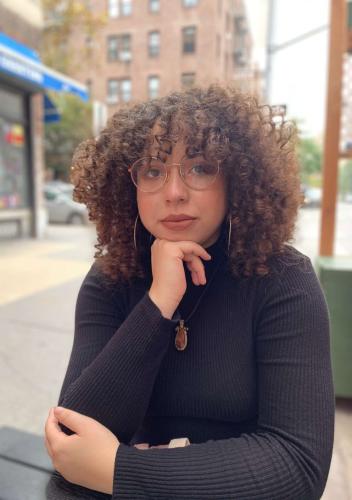The Ruth B. Mandel Dissertation Research Awards were established in honor of our founding director, Ruth B. Mandel, whose leadership was critical in building CAWP into a national center with multi-faceted research, education, public service, and information programs, helping to define and build the field. The Mandel Awards support dissertation research on women, gender, and U.S. politics and are $2,000 each in value.
Learn more about the Ruth B. Mandel Dissertation Research Awards here, and learn more about Ruth’s remarkable life here.
2025 Ruth B. Mandel Dissertation Award Recipients
Black Athenas: The Politics and Power of Black Officers in the 1940s Women’s Army Corps
Abstract: My dissertation examines how Black officers of the Women’s Army Corps managed competing responsibilities between the Army administration and Black enlisted women. Black enlisted women saw their officers not as upholders of segregation like the Army did, but, as their first and primary line of defense against racism and sexism. I argue that Black women officers became power brokers between Black women and the state as Black enlisted women challenged officers to use their authority to commit to racial solidarity. How officers navigated the competing expectations of enlisted women and military leadership created tension within the community of Black WACs, which reveals conflicts over how to best empower Black womanhood. I center the relationships between officers and enlisted women to demonstrate how they turned the WAC into a critical site of clashing ideologies and strategies for how to successfully act as agents of change for Black womanhood.

A.J. Boyd is a doctoral candidate studying 20th-century African American history and is interested in the intersection of race, gender, and militarization. Through her research, she considers the significance of Black women’s archival practices in producing an alternative narrative to the popular memory of World War II. A.J. is a co-convener of the "Black Atlantic Writing Group" through the Rutgers Center for Historical Research, where she facilitates an encouraging environment for students to critically engage with each other’s work. In addition to being a teaching assistant for undergraduate students, she has contributed to K-12 history education through middle-school history workshops and researching and writing original textbook chapters on Black New Jersey history. A.J. is a member of the Association of Black Women Historians and a former fellow of the Schomburg Mellon Humanities Summer Institute. A.J. earned her B.A. from Indiana University Bloomington in History and African American & African Diaspora Studies in 2021.
Better Safe Than Sorry: Women of Color’s Preferences Toward Anti-Abortion Protest Interventions
Abstract: What factors contribute to women of color’s attitudes towards anti-abortion protest interventions? Since the 1970s, anti-abortion protest has been used as a disruptive tactic at abortion clinic sites. Outside of the federal Freedom of Access to Clinic Entrances Act (1994), the balancing of free speech rights of protesters and the right to seek healthcare without obstruction has primarily been managed by local clinic sites. One approach, supported by some prominent abortion rights advocacy organizations, advocates for cooperation between law enforcement and abortion clinics. Historically, clinics have also enlisted the assistance of volunteer clinic escorts or clinic defenders, to guide patients to enter the clinic as they face harassment or disinformation from anti-abortion protesters. Almost all prominent studies of anti-abortion protest fail to focus on the unique experiences, resulting from the intersection of race and gender, that women of color face as abortion seekers. I argue that the majority of political science literature has historically operated through a “pro-choice” framework, where legality of abortion is the object of analysis. Reproductive justice advocates argued that for multiply-marginalized groups, the legal standard established by Roe v. Wade was never enough to fully address healthcare access needs. I hypothesize that intersectional linked fate, or feelings that individual interests are linked to those of women of color as a whole, is a pertinent determinant of attitudes toward anti-abortion protest interventions. To ensure adequate sample size of Black, Latina, and Asian women respondents, I turn to the Collaborative Multiracial Post-Election Survey (CMPS), a cooperative, nationally representative post-presidential election online survey that collects large samples of minority groups. After utilizing CMPS data on abortion attitudes, I will then conduct a survey experiment to provide a direct comparison between preferences towards anti-abortion protest interventions, notably those that rely on policing and those that rely on volunteer clinic escorts.

Samyu Comandur (she/her) is a Political Science PhD Candidate at the University of California, Los Angeles, specializing in Race, Ethnicity, and Politics and Quantitative Methods. Her dissertation explores women of color’s attitudes towards reproductive rights in a post-Roe climate, with a focus on comparing their attitudes towards various anti-abortion protest interventions. She is a member of the sixth cohort of the Robert Wood Johnson Foundation’s Health Policy Research Scholars Program, led by the Johns Hopkins Bloomberg School of Public Health. She is also a Lead Graduate Student Researcher with the Collaborative Multiracial Post-Election Survey and the Ralph J. Bunche Center for African American Studies. Outside of the doctoral program, she organizes with Palms Unhoused Mutual Aid.
From Margin to Center: Investigating Black Women's Diverse Political Ideologies
Abstract: As the political landscape of the United States changes, Black women are being highlighted as catalysts and boundary breakers for change. Black women are being touted as liberal saviors of Democracy; however, is this the case for all Black women, and what does this mean for the future of Black women’s politics? My multi-method project responds to these questions in three ways. First, by challenging the current liberal capture of Black women because the liberal identity operates within boundaries that cannot attend to the intersectional positions of Black women. Here, liberal capture contends with Black women being a steadfast voting bloc for the Democratic Party while still being insufficiently represented within the party’s politics. Secondly, by complicating Black women’s political identities and examining their ideological beliefs and values, the opportunity is presented to better understand this group gaining political influence. Specifically, this advances new ways to understand and measure political ideology and sophistication among the public. Lastly, it qualitatively explores Black women’s ideological preferences and organizes them into a theoretical typology. This project highlights the need for dynamic mixed and multi-method approaches to investigating political belief systems and values.

India S. Lenear is a sixth-year ABD Doctoral Candidate in the Department of Political Science at Rutgers University. India’s work broadly studies Women and politics, Black Politics, and American Politics. Her work focuses on Black Women’s politics, Black politics, and Black feminism(s)/Womanism. Her research examines Black women’s political behavior, ideology, and participation through Black feminist theoretical lenses. Her dissertation examines Black women's diverse ideological self-identification, beliefs, and attitudes through mixed methods and their effect within formal and informal political spheres.
India is a member of the American Political Science Association’s Committee on the Status of Graduate Students as of Fall 2024. She is a proud alumna of North Carolina Central University, graduating magna cum laude in 2018. India’s preferred pronouns are she/her/hers.
Identity, Ideology, and Strategic Context in Congressional Elections
Abstract: My dissertation examines how gender-ideology stereotypes shape the electoral opportunities and outcomes for women congressional candidates in the U.S. Despite growing numbers of women seeking office, persistent voter assumptions about the ideological positions of women—particularly the belief that they are more liberal than their male counterparts—continue to structure the strategic decisions candidates make and the success they experience at both the primary and general election stages. Drawing on an original dataset of all U.S. House candidates from 2006 to 2020, the first two chapters use observational data to assess how gender and race intersect with candidate ideology and district competitiveness to influence where women run and which women are more likely to succeed. While the first two chapters of my dissertation leverage observational data to examine the electoral consequences of gender-ideology stereotypes, my third chapter turns to an experimental design to more directly test how voters react to candidates who engage in gendered campaign strategies. This chapter, which is the focus of this application, uses a survey experiment to test how voters respond to Republican women candidates who embrace stereotypic versus counterstereotypic campaign strategies. I develop a theory arguing that Trumpism has reshaped the gendered landscape of Republican politics, creating a pathway for women to align with the hypermasculine ethos of the MAGA movement while still embracing stereotypically feminine messaging. I posit that this dual signaling enables Republican women to overcome the traditional “competence penalty” associated with feminine presentation. This chapter directly examines whether the era of Trump has altered voter perceptions of gender and ideology, and whether MAGA-aligned women are uniquely positioned to succeed where other women in the GOP have struggled in their party. Funding will support the experimental design necessary to isolate these effects and advance our understanding of gendered presentation in polarized politics.

Alex Snipes is a PhD candidate in Political Science at Emory University. Her research focuses on gender and politics, electoral institutions, and political representation in American and comparative contexts. Her dissertation investigates how gender, race/ethnicity, and ideology interact with broader political dynamics to shape primary and general election outcomes for candidates for U.S. Congress. She also examines the intersection of gender and radical right politics, with particular attention to far-right campaigns and women’s representation within the Republican Party. Prior to her doctoral studies, Alex worked as a Research Associate and Data Analyst at EdCount, an education consulting firm in Washington, D.C. She holds an M.A. in Political Science and a B.A. in International Affairs and French from the University of Georgia.

